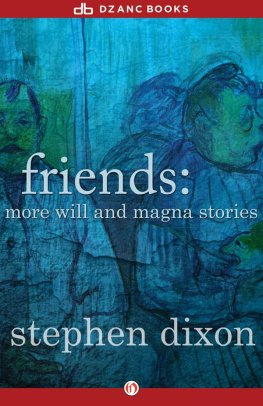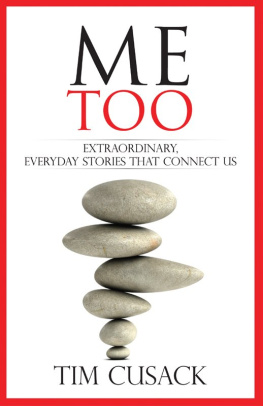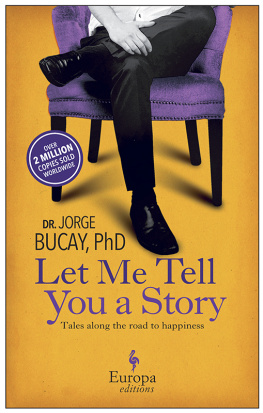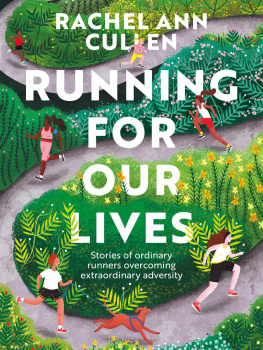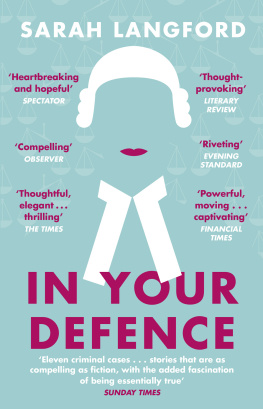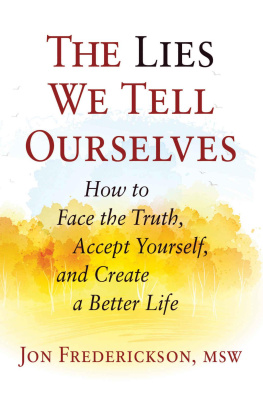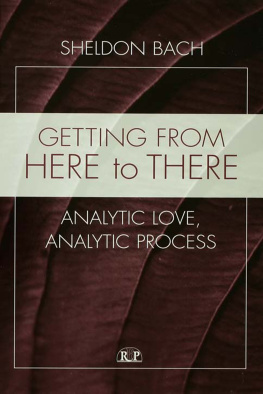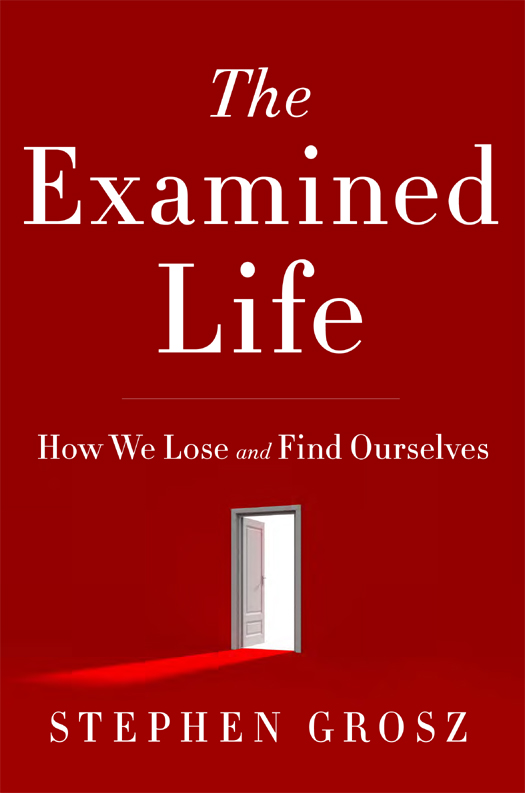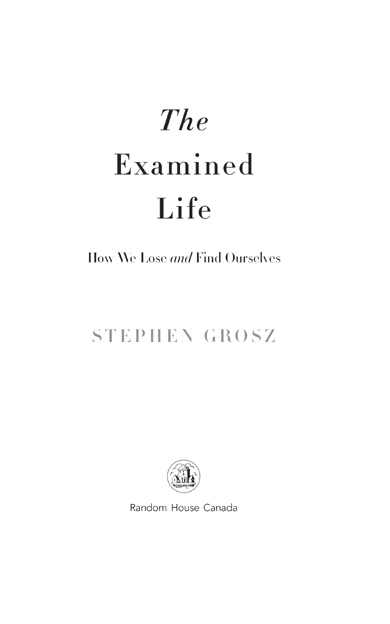PUBLISHED BY RANDOM HOUSE CANADA
Copyright 2013 Stephen Grosz
All rights reserved under International and Pan-American Copyright Conventions. No part of this book may be reproduced in any form or by any electronic or mechanical means, including information storage and retrieval systems, without permission in writing from the publisher, except by a reviewer, who may quote brief passages in a review. Published in 2013 by Random House Canada, a division of Random House of Canada Limited, Toronto, and simultaneously in the United States by W.W. Norton & Company, Inc., New York.
Distributed in Canada by Random House of Canada Limited.
www.randomhouse.ca
Random House Canada and colophon are registered trademarks.
Library and Archives Canada Cataloguing in Publication
Grosz, Stephen
The examined life : how we lose and find ourselves / Stephen Grosz.
Includes bibliographical references.
eISBN: 978-0-307-35912-4
1. Psychoanalysis. 2. Psychology. I. Title.
BF173.G755 2013 150.195 C2012-905599-9
Jacket design by Lynn Buckley
Image credits: Shutterstock
v3.1
To Nicola, Clara and Samuel
We receive and we lose, and we must try to achieve gratitude; and with that gratitude to embrace with whole hearts whatever of life that remains after the losses.
ANDRE DUBUS II , Broken Vessels
Contents
Preface
For the past twenty-five years, Ive worked as a psychoanalyst. Ive treated patients in psychiatric hospitals, psychotherapy and forensic psychotherapy clinics, child and adolescent units, and private practice. Ive seen children, adolescents and adults for consultation, referral and once-a-week psychotherapy. Most of my work, however, has been with adults in psychoanalysis meeting with one person for fifty minutes, four or five times a week, over a number of years. I have spent more than 50,000 hours with patients. The substance of that work is the substance of this book.
What follows are tales drawn from day-to-day practice. These stories are true, but Ive altered all identifying details in the interest of confidentiality.
At one time or another, most of us have felt trapped by things we find ourselves thinking or doing, caught by our own impulses or foolish choices; ensnared in some unhappiness or fear; imprisoned by our own history. We feel unable to go forward and yet we believe that there must be a way. I want to change, but not if it means changing, a patient once said to me in complete innocence. Because my work is about helping people to change, this book is about change. And because change and loss are deeply connected there cannot be change without loss loss haunts this book.
The philosopher Simone Weil describes how two prisoners in adjoining cells learn, over a very long period of time, to talk to each other by tapping on the wall. The wall is the thing which separates them, but it is also their means of communication, she writes. Every separation is a link.
This book is about that wall. Its about our desire to talk, to understand and be understood. Its also about listening to each other, not just the words but the gaps in between. What Im describing here isnt a magical process. Its something that is a part of our everyday lives we tap, we listen.
Beginnings
How we can be possessed by
a story that cannot be told
I want to tell you a story about a patient who shocked me.
When I was first starting out as a psychoanalyst, I rented a small consulting room in Hampstead, on a wide leafy street called Fitzjohns Avenue. It was near a number of well-known psychoanalytic clinics and a few minutes walk from the Freud Museum. At the south end of Fitzjohns Avenue, there is a large bronze statue of Freud.
My consulting room was quiet and spare. There was a desk just large enough for writing up notes and preparing my monthly bills, but no bookshelves or files the room wasnt for reading or research. As in most consulting rooms, the couch wasnt a couch, but a firm single bed with a dark fitted cover. At the head of the bed was a goose-down cushion, and on top of that a white linen napkin that I changed between patients. The psychoanalyst who rented the room to me had hung one piece of African folk art on the walls many years before. She still used the room in the mornings and I used it in the afternoons. For that reason it was impersonal, ascetic even.
I was working part-time at the Portman Clinic, a forensic outpatient service. In general, patients referred to the Portman had broken the law; some had committed violent or sexual crimes. I saw patients of all ages and I wrote quite a few court reports. At the same time, I was building up my private practice. My plan was to reserve my mornings for clinic work; in the afternoons I hoped to see private patients who had less extreme or pressing problems.
As it turned out, my first private patients were fairly demanding too. Looking back, I see many reasons why these first cases were difficult. Partly, there was my own inexperience. I think it takes time it took me time to realise just how very different people are from each other. And it probably didnt help that Id received a number of referrals from senior psychiatrists and psychoanalysts trying to help me get started. Doctors often refer patients to junior analysts that they dont want to see themselves or cant place anywhere else. And so I was struggling with:
Miss A., a twenty-year-old undergraduate. Although the psychoanalyst whod assessed her described Miss A. as suffering uncontrollable bouts of crying, depression and pervasive feelings of inadequacy, she presented as a cheerful young woman who insisted that she did not need treatment. In time, however, I learned that she was bulimic and regularly, compulsively, cut herself. Because she had only attended her sessions sporadically, two other therapists had given up seeing her.
Professor B., a forty-year-old research scientist, married with two children. Hed recently been accused of plagiarising a rivals work. The vice chancellor had referred the matter to the disciplinary committee. If he was found guilty and Professor B. told me it was likely that he would be he might be given the chance to resign discreetly. His physician had put him on antidepressants and asked me to see him for psychoanalysis. Professor B. vacillated wildly between states of hectic triumph mocking colleagues on the disciplinary committee, for example and utter dejection.
Mrs C., who owned and operated a small restaurant with her husband; she was a mother of three. She wanted help because she felt anxious and suffered panic attacks. In our first meeting she said that she found it difficult to relate honestly, but it was only after several months of therapy that she told me that she was having an affair with her childrens nanny, a woman who had been working for the family for the past seven years, since shortly after the birth of her first child. Now contrary to an agreement with her husband Mrs C. was secretly trying to get pregnant because she could not bear the thought of losing her nanny.
Another of my earliest patients was a young man named Peter. He was undergoing treatment at a large psychiatric hospital nearby. Three months before we met, Peter hid in the cupboard of a local church, where he tried to kill himself by taking an overdose of various drugs and then slitting his wrists. He also stabbed himself in the neck, chest and arms with a small knife. He was discovered by a cleaner. Although she was frightened, the cleaner held him as they waited for the ambulance. Who did this? she asked him. Tell me, who did this to you?


